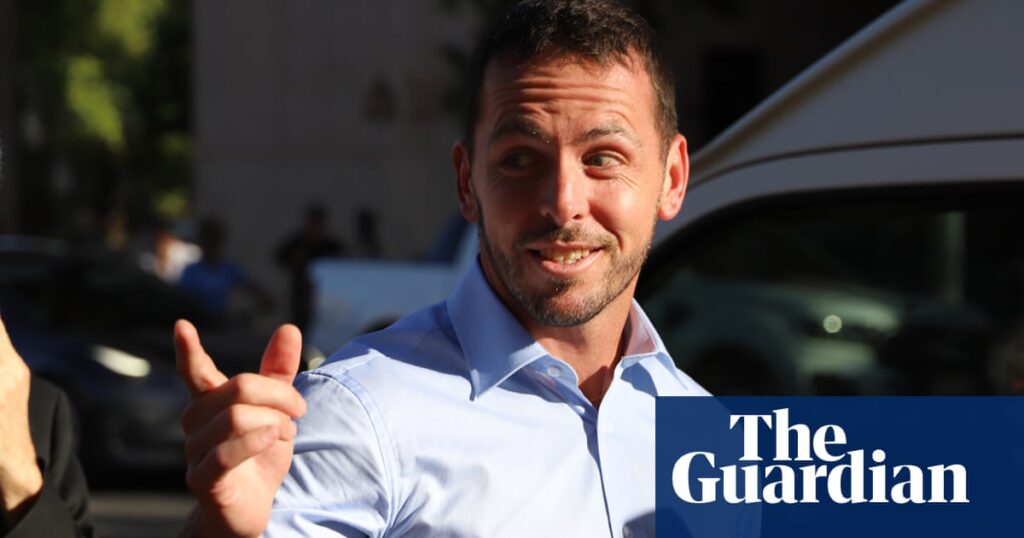Zachary Rolfe’s ego “had a lot to do with” the death of Kumanjayi Walker, and the former police officer “invented” evidence about the Warlpiri man attempting to take his gun before the fatal shooting, a court has heard.
The inquest into the death of Walker is holding its final hearings, almost two years after it was due to be completed.
Walker, 19, was killed by then Northern Territory police constable Rolfe during a bungled arrest in the remote NT community of Yuendumu on 9 November 2019.
Rolfe was later charged with murder but was acquitted of all charges after a supreme court trial.
The inquest into the case is hearing final oral submissions in Alice Springs this week.
The counsel assisting the coroner, Dr Peggy Dwyer, said on Wednesday that it would be submitted to the NT coroner, Elisabeth Armitage, that she should find Rolfe “invented” evidence during his trial that Walker tried to take his police weapon and she could not accept he feared for his life at the time of the shooting.
Dwyer said Armitage should also reject submissions on behalf of Rolfe that his conduct prior to November 2019 was irrelevant to the case.
Dwyer said it was important to consider Rolfe’s history in the NT police force and before he joined, including his being dishonest during his application, and that he held racist attitudes towards Aboriginal people.
“It’s not done in order to be overly critical of Mr Rolfe, or demonise him … He is more than the sum of what happened on 9 November,” Dwyer said.
“Mr Rolfe’s legal team urges your honour not to sugarcoat what happened in relation to Kumanjayi Walker’s behaviour on 9 November, and neither should your honour sugarcoat the actions of Rolfe.”
Dwyer said Rolfe had a history of using force during arrests and a contemptuous attitude to authority and the rules; used violence to demonstrate his dominance over others, particularly young Aboriginal men; and had a tendency to seek out situations where the use of force could be necessary.
“Ego was wrapped up in his use of force, and ego had a lot to do with the events of November 2019.
“Perhaps Mr Rolfe could have been shaped to be a better officer … This court will never know.”
Dwyer said that counsel assisting’s submissions to the coroner would recommend that Armitage find Walker did not try to take Rolfe’s police firearm immediately before the officer shot him three times.
Walker tried to stab the officers with scissors when they attempted to arrest him.
But Rolfe said during his trial that Walker also put his hand on his gun as they struggled before the shooting.
Dwyer said Rolfe had never provided that detail before giving evidence, including in conversations with colleagues, lengthy notes about the shooting in his police diary, and in multiple takes of a video interview with a journalist at the Australian.
She said the evidence Rolfe gave at trial about the gun was “an invention”.
“That’s a significant finding, your honour, and I make it carefully and after careful consideration, and we have set out the evidence in full,” Dwyer said.
after newsletter promotion
She said that Armitage also “could not accept, even on balance” that Rolfe “feared for his life and [his colleague’s] life” at the time of the shooting, in part because of previous issues with his credibility.
In relation to his credibility, Dwyer said Rolfe had a tendency to “dissemble” during his evidence in court, and that Armitage should also consider his history of lying in the past.
Dwyer also said that Rolfe knew his declining mental health could also mean he would become more volatile in heightened situations, but that he had not let his superiors know about this decline in November 2019.
Dwyer said it was important the public understood that the primary reason for the delays in the case were a series of legal challenges, all of which had been unsuccessful, though she said she was not critical of the challenges.
Dwyer said the coroner received 1,990 pages of written submissions from parties to the inquest, and it was expected that findings would be delivered in 2025.
She said submissions on behalf of Rolfe contending that Armitage should give him notice if she intended to make adverse findings against him were “misconceived”.
Dwyer said the hearings this week provided the opportunity for Rolfe’s lawyers to voice their opposition to any possibility of adverse findings.
She added that Walker’s story was another example of what Armitage found in a family violence inquest, which delivered its findings this week: that children exposed to violence were more likely to become involved in the criminal justice system.
Dwyer said evidence before the inquest showed Walker lived in a home that was plagued by excessive alcohol consumption and domestic violence from the ages of four to 10.
“Kumanjayi Walker’s story exemplifies exactly what your honour has said in the context of the family violence inquest,” Dwyer said.
“To avoid another tragedy we need a holistic approach that recognises the strengths and challenges of children in Yuendumu and remote communities like it.”
The hearing continues.
Premium IPTV Experience with line4k
Experience the ultimate entertainment with our premium IPTV service. Watch your favorite channels, movies, and sports events in stunning 4K quality. Enjoy seamless streaming with zero buffering and access to over 10,000+ channels worldwide.

















